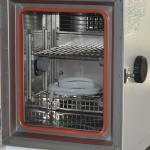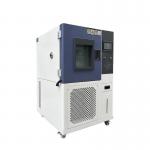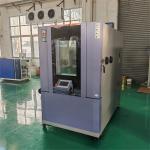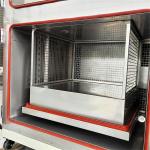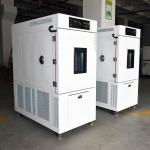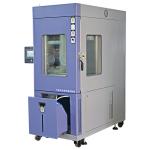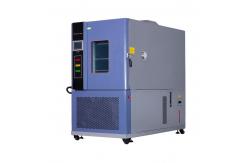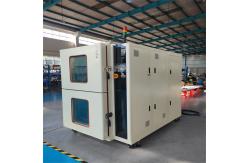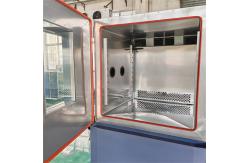In the highly demanding and technologically advanced realms of
aerospace and defense electronics, the need for precision testing
equipment is non-negotiable. The Customized Temperature Humidity
Test Chamber emerges as a crucial tool, purpose-built to evaluate
the performance and durability of electronic components and systems
in the face of extreme temperature and humidity conditions. This specialized test chamber is designed to subject aerospace and
defense electronics to a wide spectrum of temperature and humidity
stressors. It serves aerospace manufacturers, defense contractors,
and research institutions. The core objective is to simulate the
harsh and variable environmental conditions that these electronics
encounter during their operational lifecycles, including
high-altitude flights, space missions, and deployment in diverse
terrains. By conducting comprehensive tests, potential weaknesses
and failure points can be identified and addressed, ensuring the
highest level of reliability and safety for critical aerospace and
defense applications. - Robust and Aerospace-Grade Construction
- The chamber is constructed with a heavy-duty framework, typically
fabricated from high-strength aerospace alloys, to withstand the
rigors of intense testing. The exterior is engineered to be highly
durable and resistant to corrosion, radiation, and other
environmental hazards. The interior is lined with a refractory
material that can endure rapid and extreme temperature changes
without compromising the integrity of the test environment. The
door is designed with a reliable sealing mechanism, incorporating a
high-quality gasket and a multi-point locking system, ensuring an
airtight enclosure. It also features a large viewing window made of
toughened, heat-resistant glass, allowing for visual inspection of
the testing process while maintaining the chamber's environmental
integrity.
- Precision Temperature and Humidity Control Systems
- Temperature Control: Capable of maintaining a vast temperature
range, from -70°C to +150°C, with an exceptional accuracy of
±0.3°C. It utilizes advanced cryogenic and heating technologies,
along with a sophisticated feedback loop and multiple
high-precision temperature sensors. This ensures uniform
temperature distribution throughout the chamber and minimal
temperature gradients. The control panel allows for precise
programming of temperature profiles, including rapid ramping,
extended dwell times, and complex cycling sequences, mimicking the
extreme thermal conditions experienced during aerospace missions,
such as the frigid temperatures of space and the intense heat
during re-entry.
- Humidity Control: The humidity control system is equally precise,
capable of achieving humidity levels from 0% to 100% RH (Relative
Humidity), with an accuracy of ±2% RH. It employs a combination of
steam humidifiers and dehumidifiers, along with a carefully
designed air circulation system. The chamber is equipped with
humidity sensors that continuously monitor the internal humidity,
and the control system adjusts the humidification or
dehumidification processes accordingly. This allows for the
creation of stable and dynamic humidity environments, replicating
the diverse moisture conditions that aerospace and defense
electronics may face, from the arid conditions of deserts to the
humid environments of tropical regions and the potential moisture
exposure during spacewalks or underwater operations.
- Advanced Instrumentation and Data Acquisition
- The chamber is outfitted with a comprehensive suite of sensors.
Temperature and humidity sensors are supplemented by pressure
sensors to monitor any pressure changes that could affect the test
results or the performance of the samples. Additionally, radiation
sensors can be incorporated to assess the impact of radiation on
electronics in aerospace applications. These sensors are connected
to a state-of-the-art data acquisition system that records and
stores all the relevant data. The data acquisition system offers a
high sampling rate, typically ranging from 100 to 1000 samples per
second, ensuring that even the most rapid changes in temperature,
humidity, pressure, or radiation are accurately captured. The
collected data can be accessed and analyzed in real-time or
retrieved later for in-depth studies. The system is also compatible
with aerospace-specific data analysis software and can generate
detailed reports and graphs, facilitating the interpretation and
communication of test results.
- Enhanced Safety and Compliance Features
- The Customized Temperature Humidity Test Chamber is designed to
meet the strict safety and compliance requirements of the aerospace
and defense industries. It incorporates multiple safety features,
such as an automatic emergency shutdown system that activates in
case of any critical malfunction or if the temperature, humidity,
or pressure exceeds the safe operating limits. The chamber is also
equipped with a fire suppression system, which can quickly
extinguish any flames that may occur due to a sample failure or
electrical issue. Ventilation systems are in place to remove any
potentially harmful gases or fumes that could be generated during
the testing process. The control panel is designed with safety
interlocks and clear warning indicators to prevent accidental
operation and ensure the well-being of the personnel. It also
complies with relevant aerospace and defense standards, such as
MIL-STD-810 for environmental testing and various space agency
requirements, ensuring that the testing procedures are recognized
and accepted within the industry.
- Chamber Size and Capacity: Available in various sizes to accommodate different aerospace and
defense electronic components and systems. The volume can range
from a few cubic feet for testing small circuit boards and sensors
to several hundred cubic feet for larger assemblies like satellite
payloads or avionics racks. The interior dimensions are optimized
for proper air circulation and uniform temperature and humidity
distribution, ensuring that all parts of the sample are effectively
tested.
- Temperature Cycling Rate: Can perform temperature cycles at a rate of several cycles per
hour, depending on the specific requirements of the aerospace or
defense application. For example, it can conduct 3 to 5 cycles per
hour between -50°C and +100°C, subjecting the sample to repeated
and rapid thermal stress, which is essential for evaluating the
equipment's resistance to thermal fatigue and its ability to
function reliably in fluctuating temperature environments.
- Humidity Cycling Rate: The humidity can be cycled at a rate that allows for the
simulation of rapid changes in moisture conditions. The chamber can
adjust the humidity levels within a short period, typically within
10 to 30 minutes, depending on the desired test scenario,
replicating the sudden humidity shifts that may occur during
aerospace operations, such as flying through different cloud layers
or transitioning from a dry launch pad environment to a humid
oceanic region.
|
